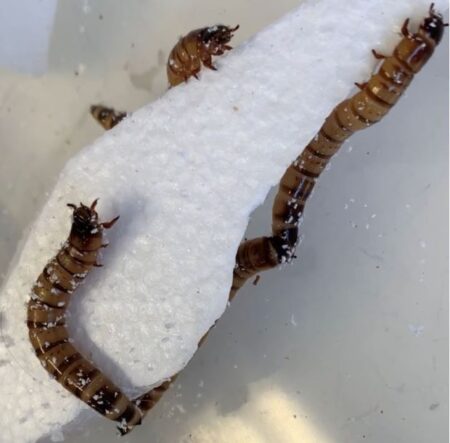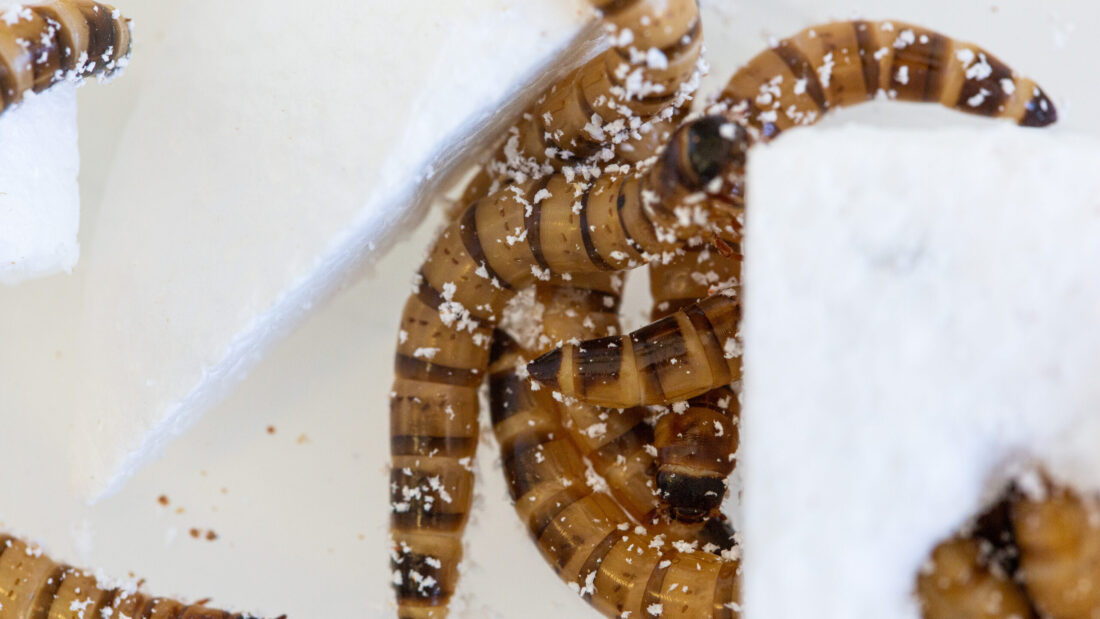PhD candidate Jiarui Sun from University of Queensland’s School of Chemistry and Molecular Biosciences is playing a key role in research that could help incentivise plastic waste recycling through bio-upcycling.
Sun recently submitted her PhD thesis Illuminating Microbial Dark Matter via culture-independent methods undertaken on an Australian Research Training Program scholarship with UQ’s Australian Centre for Ecogenomics.
A key study, conducted alongside a team of UQ researchers, informing her research project involved examining a species of worm with an appetite for polystyrene.
The team’s research trial revealed that the Zophobas morio – often known by its common name ‘superworm’ – can eat through polystyrene, thanks to a few special bacteria living in their gut.

The study involved feeding superworms different diets over a three-week period. Some were given polystyrene foam, some bran, while others were put on a fasting diet.
The findings indicate that gut microbiome of superworms could be deployed as mini recycling plants, shredding polystyrene with their mouths and then feeding it to the bacteria in their gut. The breakdown products produced from this reaction can then be used by other microbes to create high-value compounds such as bioplastics.
Plastic wastage is a huge global problem and Sun hopes their research can be utilised to help incentivise plastic waste recycling and reduce landfill. “Our idea about the bio-upcycling is to use cheaper compounds (such as waste plastics) as substrates to produce economically high-value products,” she says.
Incorporating recycled content has become normal practice in many products but according to Sun microbes could help diversify the use of the waste plastics. This would likely increase utilisation rates. “A bio-upcycling system can be impactful also because it will inspire people to recycle, eventually we can save our resources for the future,” says Sun.
The team’s research investigated the gut microbial community of polystyrene eating superworms using metagenomics, and the practical outcomes. According to Sun, this research is just the beginning of a long-term effort to obtain plastic-degrading enzymes.
“The ultimate goal is to find the plastic degrading enzymes produced by microbes then understand their chemical properties. Eventually we hope scientists can safely and efficiently apply those enzymes to landfill sites to build future recycling systems,” she says.
Zophobas morio – often known by its common name ‘superworm’ – eating through polystyrene. Video supplied by University of Queensland.
The research findings were recently published in a co-authored paper for Microbial Genomics. Sun acknowledges that building a strong publication record is a consideration when working towards a future career but the desire to share important learnings with the world provided the strongest motivation.
Communicating and connecting with researchers in associated fields was an additional benefit of the publication process. In this respect, she says the act of publishing provided a guide in an ocean of information and a cue for unexpected opportunities.
Sun cites the example of a chemist who read the team’s paper then reached out and offered advice on what could be done with the degraded polystyrene. “This information was very valuable as it not only filled our knowledge gap, but also prevented us from wasting time and project spend on unnecessary experiments,” says Sun.
The Microbial Genomics paper is not Sun’s first co-authored piece, she has published several pieces throughout her candidature, but the experience provided an important learning experience – it demonstrated the importance of never giving up. “This research was conducted in 2017, but surprisingly it took us over four years to finalise the paper,” she says.
“I had to re-run the sequence analysis every year with updated versions of software or databases. Luckily, the improvement of prokaryotic taxonomy databases as well as new studies published in relevant fields finally meant we could give the paper a good story.”
Managing the different opinions among authors was another challenge that came with co-publishing, but it was one that offered valuable lessons. “Through my co-publishing experience, I learnt that efficient communication of convincing results is essential when dealing with the disagreement,” says Sun.
Reflecting on her graduate research study experience, Sun is effusive, “The most rewarding element is the fulfilling life I am currently living.” Her research journey hasn’t all been smooth sailing – the writing process has been a challenge, one that required utilising listing sentence frames and daily production limit strategies – but she has found great fulfilment in the detail of her research. “Watching a command line executed without errors, seeing Qubit showing my sample has enough amount of DNA, beautifying a figure to its best look. Each of those moments brings me happiness, energy and power,” she says.
As for she advice to others considering undertaking PhD study, Sun suggests finding a research topic that you are passionate about is key. However, she also suggests that finding like-minded and supportive supervisors – her supervision team includes Dr Christian Rinke, Dr Paul Evans, Dr Ben Woodcroft and Prof Phil Hugenholtz – is hugely important. “Be mentally prepared, but also don’t hesitate to seek help when you are not well,” she says.
Participating in an industry placement (she is currently undertaking an internship with Microba Life Sciences) has also been hugely helpful, “It means there is no need to bother choosing between academia or industry” she jokes.
You can learn more about Jiarui Sun’s research by following her @jemma_sun on Twitter.

